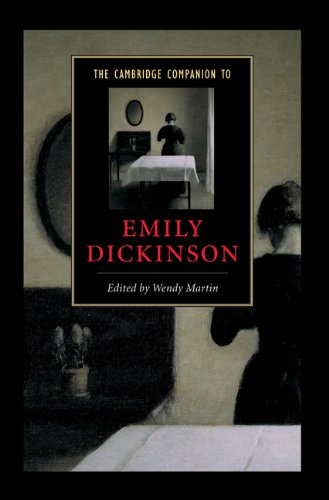Product desciption
The Cambridge Companion To Emily Dickinson Cambridge Companions To Literature Wendy Martin by Wendy Martin 9780511073915, 9780521806442, 0521806445, 0511073917 instant download after payment.
It's hard to exaggerate the importance of Emily Dickinson's poetry, as we mark her 177th birthday (born December 10, 1830, Amherst, Massachusetts). But is this poet well understood, and are her birthdays and other important dates even recognized other than by those already devoted to her? One editorial reviewer for Amazon of the Cambridge Companion makes a key mistake-stating that she is one of our most important "19th Century poets." No--Dickinson is one of the two most important American poets in all our literature-of whatever century, and most likely including this new one- the other candidate for top honors being Walt Whitman. Arguably, Dickinson is the more important of the two given the resonance in our later poetry with the depth of her interior, private vision. Whitman aspired to be America's great public bard-a project Robert Pinsky and others have pointed out that did not succeed (see my Amazon review of Pinsky's Democracy, Culture and the Voice of Poetry). But Dickinson's intense private vision is more responsible than Whitman's public one for generating followers and inspiring others. Wallace Stevens and Hart Crane are two examples. With rare exceptions, American poetry has developed more along the lines suggested by her more private vision and voice than it has to the broad, public sweep of Whitman's long-windedness. Everyone more or less knows who Dickinson is, and most educated persons have probably read at least one of her poems. But, do we grasp what a deep treasure trove Dickinson has left us? Do we get beyond the superficial portrait most have of her? And most importantly, how do we access the wealth of creativity and insight that lies beyond the few dozen or so most popular Dickinson poems most of us are familiar with? Wendy Martin's Cambridge Companion to Emily Dickinson is a great place to start broadening our view of her. The war over Dickinson's manuscripts (today part still belong to Harvard and part to Amherst College) and for defining her as a person is something that happened shortly after she died and was caused by a schism of sorts in her family when her brother, Austin Dickinson, took a lover, Mabel Loomis Todd, outside of his marriage to Emily's beloved friend, companion and lifelong correspondent, Susan Dickinson. This is a really racy story! It is ably narrated in Betsy Erkkila's essay "The Emily Dickinson Wars." Christopher Benfey's essay "Emily Dickinson and the American South," is also remarkable. How do you explain the fact that Dickinson wrote throughout the Civil War, Emancipation, etc. and has almost nothing to say about these huge events? While not a Southern sympathizer, there is much in her work that accords with the agrarian, aristocratic elements in American life that was also represented in the South and its literature, and she fit the sensibility of those who yearned for a pre-Industrial America in the 20th Century quite well-although it doesn't really fully define her to see it in this way. Wendy Martin's own essay on Dickinson's poetic strategies is a strong overview of how some of the larger elements in Dickinson's life worked themselves out in her verse, including her deeply meaningful relationship with her sister-in-law. Martin is very strong on her analysis of the poetic use of words like "sun" which appears so often in the poems, and she sees Dickinson as one who revels with her volcanic creativity in night and darkness. It's a luxurious image and picture of her. I have to confess that, though our last names are the same, I am no relation to Emily Dickinson. Starting when I was a very young child, my mother (who grew up not far from Amherst in a similar setting) read her to me frequently, and I was somewhat confused about the name. For quite some time I thought when my mother said we were "not related" that we really were related. I felt the poems were something that had been written to us, like letters from a relative, which were also sometimes read aloud to the family. I was disappointed to learn that "no relation" actually meant we weren't related-and somehow before figuring it out got some of the deeper messages even as a very young child -it was as though they had been meant especially for me and sent from a kindred soul. One suggestion for how to celebrate Emily Dickinson's birthday each December 10th is to read this book and others like it-and to re-encounter Dickinson's poems over and over. They richly repay our efforts to understand and enjoy them.


